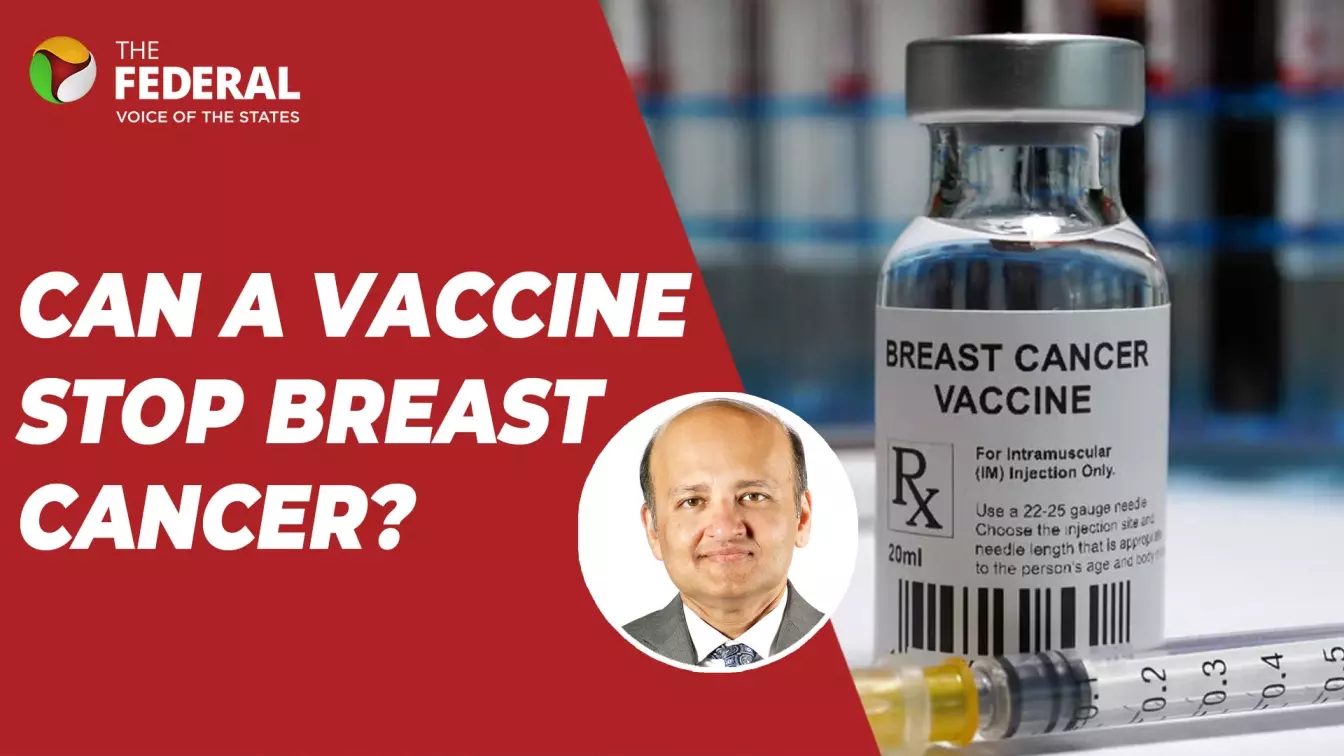
Dr. Amit Kumar, CEO, Anixa
Anixa's breakthrough vaccine: Can breast cancer be prevented?
Anixa CEO Dr Amit Kumar, in an exclusive interview with The Federal, explains how their vaccine could stop breast cancer before it starts

A major development in breast cancer prevention could soon change the way the world tackles this deadly disease. Anixa Biosciences, in collaboration with Cleveland Clinic, has announced promising Phase 1 trial results of its breast cancer vaccine. With 70-75% of participants showing a strong immune response, this vaccine has the potential to stop breast cancer before it starts. In this exclusive conversation, Dr Amit Kumar, Chairman and CEO of Anixa Biosciences, explains the science behind the vaccine, its future potential, and what lies ahead.
What exactly does your breast cancer vaccine target, and how does it train the body’s immune system?
We are targeting a protein called alpha-lactalbumin. This protein enables lactation and is produced in the mammary glands during breastfeeding. After a woman stops breastfeeding and is done having children, the protein typically disappears and does not reappear—except in most breast cancer cells. Our approach trains the immune system to destroy cells producing this protein. This means the immune system attacks cancer cells at their earliest stage, before they can multiply enough to be detected by a mammogram.
Also Read: National Doctor's Day | Why doctors must prioritise self-care amid huge stress
What were the key takeaways from your Phase 1 trial and why is the immune response so significant?
Our Phase 1 trial had three main goals: ensure the vaccine’s safety, determine the maximum tolerated dose, and confirm an immune response. We found the vaccine to be safe, with only minor injection site irritation reported. Importantly, 70-75% of participants showed a strong immune response, and the rest showed some level of response. This means the vaccine is effectively training the immune system to target our protein of interest.
Does this vaccine represent a broader cancer prevention strategy for Anixa?
Yes. α-lactalbumin is specific to breast cancer, but we've identified a protein for ovarian cancer and are researching targets for lung, prostate, and colon cancers. If this works for breast cancer, it could change how we prevent or treat many cancers. The aim is to eventually vaccinate against multiple cancers, much like we’ve done for diseases like polio.
How is AI helping you discover new vaccine targets?
AI and high-performance computing help us analyse thousands of proteins quickly and efficiently to identify vaccine targets for different cancers. We’ve already moved our ovarian cancer target into animal testing, and AI is accelerating our search for other cancer-specific proteins.
What are your Phase 2 trial plans, and what will define success?
Phase 2 will verify safety and immune response and measure how effective the vaccine is. This will involve a placebo group for comparison. Half the participants will receive the vaccine with standard care; the other half, standard care plus placebo. We’ll assess their progress using imaging and blood biomarkers. We hope to start Phase 2 next year, and it will likely run for two to three years.
Why did the U.S. Department of Defense fund this trial, and does this open doors to other funding sources?
The Department of Defense supports breakthrough research that can transform healthcare. They saw this vaccine’s potential to change cancer prevention and treatment. All of our Phase 1 work was funded by them, and we’ll seek more government and private funding as we progress.
If trials go as planned, when could this vaccine reach patients?
If all goes well, we hope to make the vaccine available in stages. First, for women currently battling breast cancer, then for preventing recurrence, and finally for primary prevention in women who have never had breast cancer. We estimate the first stage could be reached in about five years.
Are there plans to ensure global access, especially for women in lower-income countries?
Our aim is to partner with large pharmaceutical and distribution companies to make this vaccine globally accessible. We hope its cost will be modest when it’s approved for primary prevention so women everywhere can benefit.
The content above has been generated using a fine-tuned AI model. To ensure accuracy, quality, and editorial integrity, we employ a Human-In-The-Loop (HITL) process. While AI assists in creating the initial draft, our experienced editorial team carefully reviews, edits, and refines the content before publication. At The Federal, we combine the efficiency of AI with the expertise of human editors to deliver reliable and insightful journalism.

